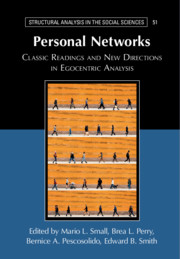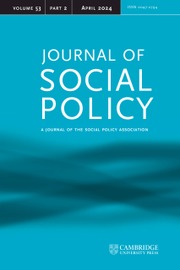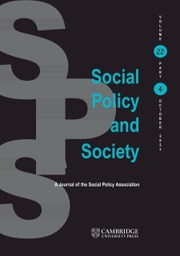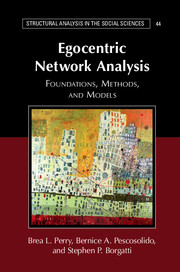
Personal Networks
Classic Readings and New Directions in Egocentric Analysis
£145.00
Part of Structural Analysis in the Social Sciences
- Editors:
- Mario L. Small, Harvard University, Massachusetts
- Brea L. Perry, Indiana University, Bloomington
- Bernice Pescosolido, Indiana University, Bloomington
- Edward B. Smith, Northwestern University, Illinois
- Date Published: September 2021
- availability: In stock
- format: Hardback
- isbn: 9781108839976
£
145.00
Hardback
Other available formats:
Paperback, eBook
Looking for an inspection copy?
This title is not currently available on inspection
-
Social networks are ubiquitous. The science of networks has shaped how researchers and society understand the spread of disease, the precursors of loneliness, the rise of protest movements, the causes of social inequality, the influence of social media, and much more. Egocentric analysis conceives of each individual, or ego, as embedded in a personal network of alters, a community partially of their creation and nearly unique to them, whose composition and structure have consequences. This volume is dedicated to understanding the history, present, and future of egocentric social network analysis. The text brings together the most important, classic articles foundational to the field with new perspectives to form a comprehensive volume ideal for courses in network analysis. The collection examines where the field of egocentric research has been, what it has uncovered, and where it is headed.
Read more- The first authoritative overview of social network research that emphasizes personal networks
- Includes important, classic as well as newly commissioned articles
- Suitable for courses on social networks and network analysis in the social sciences
Reviews & endorsements
'Much of the world thinks in terms of village-like groups and individuals, when in reality they're operating in social networks. That's why the Covid-19 virus spreads so quickly. Few people live in tight bubbles – they maneuver among overlapping partial networks of friends, family, neighbors, schools, and work. This myth-busting book is a masterpiece – brilliantly showing the impact of personal networks in our lives. Its unique format shows the path-breaking development of the network perspective – by linking classic readings and current research into community, cognition, culture, social capital, social movements, work, inequality, and social media.' Barry Wellman, FRSC
See more reviews'Personal Networks is an exemplary collection and a signal contribution to the field of social network analysis. The introduction provides both an overview for the novice and a synthesis that will interest even veteran network scholars. The classic works are impeccably chosen, with astute excerpting for undergraduate syllabi and substantial and definitive commentaries by leading contemporary authors. More recent classics are equally well chosen – I assign almost all of them in my graduate or undergraduate classes – and the extensive and engaging commentaries, in most cases by the original authors, represent valuable overviews in their own right. The papers in the final section likewise add value by reviewing research and developing theory on central fields of sociology to which the study of personal networks contributes. Personal Networks not only aggregates the main ideas in its area, it integrates them, defining a field and a research agenda. It will be an indispensable resource for anyone teaching a graduate or undergraduate course in social network analysis, a one-stop shopping experience for graduate students taking exams in this field, and a source of insight for any scholar working in this area.' Paul DiMaggio, NYU
Customer reviews
Not yet reviewed
Be the first to review
Review was not posted due to profanity
×Product details
- Date Published: September 2021
- format: Hardback
- isbn: 9781108839976
- length: 768 pages
- dimensions: 258 x 181 x 42 mm
- weight: 1.54kg
- availability: In stock
Table of Contents
Part I. Background
Introduction
Part II. Early Foundations
1. From Simmel, 'On the Significance of Numbers for Social Life: Introduction,' 'The Isolated Individual and the Dyad,' 'The Triad,' and The Web of Group Affiliations: Commentary, 'Georg Simmel's Contribution to Social Network Research'
2. From Katz and Lazarsfeld, Personal Influence: Commentary, 'Influencers, Backfire Effects and the Power of the Periphery'
3. From Mitchell, 'The Concept and Use of Social Networks': Commentary, 'On J. Clyde Mitchell's 'The Concept and Use of Social Networks''
4. From Bott, 'Urban Families: Conjugal Roles and Social Networks': Commentary, 'Commentary on Bott's 'Family and Social Network''
5. From Festinger, Schachter, and Back, Social Pressures in Informal Groups: Commentary, 'Festinger, Schachter, and Back's Social Pressures in Informal Groups'
6. From Bernard et al., 'The Problem of Informant Accuracy': Commentary, 'Implications of Informant Accuracy Research for Ego Networks'
7. From White, Identity and Control: Commentary, 'On Parachutes and Lion-Taming'
Part III. Later Foundations
8. From Fischer, To Dwell among Friends: Commentary, 'From the Northern California Community Study, 1977–78, to UCNets, 2015–20'
9. From Granovetter, 'The Strength of Weak Ties': Commentary, 'Strength of Weak Ties in the Labor Market: An Assessment of the State of Research'
10. From Wellman and Wortley, 'Different Strokes from Different Folks': Commentary, 'A Network Pilgrim's Progress: Twenty-Six Realizations in Fifty-Five Years'
11. From Coleman, 'Social Capital in the Creation of Human Capital': Commentary, 'Three Decades of Research into Social Capital: Achievements, Blind Spots, and Future Directions'
12. From Pescosolido, 'Beyond Rational Choice': Commentary, 'Confronting How People Cope with Crisis: From the Social Organization Strategy Framework to the Network Episode Model to the Network Embedded Symbiome'
13. From Feld, 'The Focused Organization of Social Ties': Commentary, 'Reflections On 'The Focused Organization of Social Ties' and Its Implications for Bonding and Bridging' 14. From Burt, Structural Holes: Commentary, 'Structural Holes Capstone, Cautions, and Enthusiasms'
15. From Laumann, Marsden, and Prensky, 'The Boundary Specification Problem in Network Analysis': Commentary, 'On the Boundary Specification Problem in Network Analysis: An Update and Extension to Personal Social Networks'
16. From McPherson, Smith-Lovin, and Cook, 'Birds of a Feather': Commentary, 'The Enormous Flock of Homophily Researchers: Assessing and Promoting a Research Agenda'
17. From Huckfeldt and Sprague, 'Networks in Context': Commentary, 'Individuals, Groups, and Networks: Implications for the Study and Practice of Democratic Politics'
18. From Nan Lin, 'Building a Network Theory of Social Capital' Commentary, 'Social Capital: An Update'
19. On the General Social Survey: 'Egocentric Network Studies within the General Social Survey: Measurement Methods, Substantive Findings, and Methodological Research'
Part IV. New Perspectives
20. On Cognition: 'Network Representation Capacity: How Social Relationships are Represented in Human Mind'
21. On Mobilization: 'How Actors Mobilize their Networks in Practice'
22. On Trust: 'Self-Verification, Trust, and Social Capital Mobilization'
23. On Dynamics: 'Personal Network Dynamics: Organizing Principles of Stability and Change from Complex Systems Theory'
24. On Inequality: 'The Context of Network Inequality'
25. On Culture: 'The Problem of Culture Flows in Weak Ties'
26. On Migration: 'Personal Networks and Migration Trajectories'
27. On Movements: 'The Opportunities and Challenges of Studying Social Movement Ego-Networks: Online and Offline'
28. On Social Media: 'Studying Social Media from an Ego-Centric Perspective'.
Sorry, this resource is locked
Please register or sign in to request access. If you are having problems accessing these resources please email [email protected]
Register Sign in» Proceed
You are now leaving the Cambridge University Press website. Your eBook purchase and download will be completed by our partner www.ebooks.com. Please see the permission section of the www.ebooks.com catalogue page for details of the print & copy limits on our eBooks.
Continue ×Are you sure you want to delete your account?
This cannot be undone.
Thank you for your feedback which will help us improve our service.
If you requested a response, we will make sure to get back to you shortly.
×










